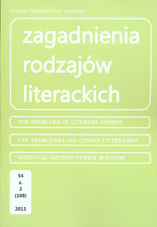Krytyka retoryczna: wprowadzenie do metody
Rhetorical Criticism: Introduction to Method
Author(s): Jakub Z. LichańskiSubject(s): Literary Texts
Published by: Łódzkie Towarzystwo Naukowe
Summary/Abstract: Rhetorical Criticism has its roots in two traditions. The first is the tradition of téchne rhetorikéé and its beginning is in the works by Plato and Aristotle (for part of the scholars the early days of r.c. are in the time of Hellenistic period and in the work by Marc Fabius Quintillian). The second is the tradition of Herbert A. Wichelns' article The Literary Criticism of Oratory from 1925. From the time of Wichelns rhetorical criticism developed in an extremely dynamic and has become one of the most important analytical methods of all of the “products" of language not only in the public/ political oratory, and also penetrated into art criticism (in the broadest sense of the term). In this issue I will try to explain both the history and methods used in rhetorical criticism. I think that this is one of the most interesting and compelling research methods, not only the linguistic creations, but all objects of human symbolic activity. Also − one of the best ways to discover the intentions of the author and used sometimes the persuasion as a techniques of manipulation of the audience. In the issue I present the history of rhetorical criticism from the Antiquity (Plato's Ion and Aristotle's Poetic and Rhetoric) to the contemporary, and the methods used in rhetorical criticism. These methods are tree kinds: the tradition of speech communication, the tradition of rhetoric/ composition, and the different programs using at the universities in the USA. In conclusions I suppose that the rhetorical criticism is one of the most effective methods of analysis all kinds of texts, not only language texts but also works of art. This follows from the fact that rhetoric should be understood more broadly − as a science of patterns and processes of communication. I remain in keeping with ancient tradition, because Quintilian described it as follows Rhetorice est inveniendi recte et disponendi et eloquendi cum firma memoria et cum dignitate actionis scientia [Quint., V.10.54 − Rhetoric is the knowledge/ science on how to correctly find, arrange and utter words (i.e. make utterances in good language form), using good memory, and present any text with dignity It brings back the opinion of Chaim Perleman, who said in The Realm of Rhetoric: [...] rhetoric covers the vast field of nonformalized thought: we can thus speak of “realm of rhetoric". It is in this spirit that Professor Walter Jens of the University of Tübingen described as “the once and future queen of the human sciences" [alte und neue Königin des Wissenschaften]
Journal: Zagadnienia Rodzajów Literackich
- Issue Year: 54/2011
- Issue No: 2
- Page Range: 267-301
- Page Count: 35
- Language: Polish

